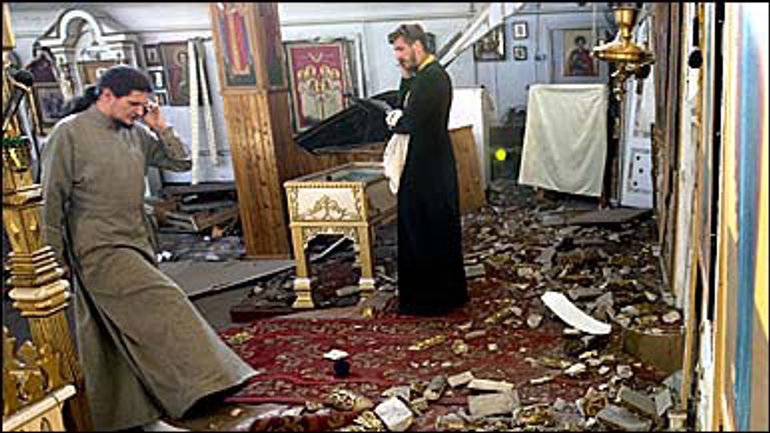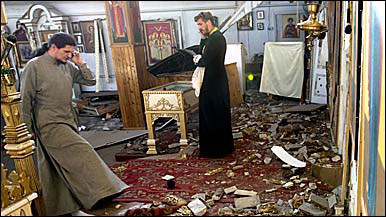Puppet Justice / on the Zaporizhya Church explosion

The trial of three young men charged with planting a bomb in a Zaporizhya Church on 28 July 2010 which killed an elderly nun continues to warrant deepest concern. While the prosecutions of Yulia Tymoshenko and Yury Lutsenko have received wide coverage, the fate of the three men is seldom mentioned outside Zaporizhya. Yet the cases bear very many features in common, and demonstrate grave degradation of the judicial and law enforcement systems in Ukraine. Perhaps most frighteningly, there is a widespread belief in Zaporizhya that the men are innocent, yet nobody expects an acquittal. Developments over the last few months seem to confirm such pessimism. Before considering these, however, the events of 2010 must be recalled, including one fatal detail which has influenced three men’s lives.
Fast-track crime solving

On 28 July 2010, the Festival of the Baptism of Kyivan Rus, a homemade bomb exploded in the Svyato-Pokrovsk Church in Zaporizhya. An 80-year-old nun died later in hospital of injuries received.
On 29 July President Yanukovych was televised sternly demanding of the Interior Minister, the Head of the Security Service and Prosecutor General that the crime be solved immediately. He was assured that the case would be cracked within the week.
On 6 August the then Interior Minister, Anatoly Mohylyov announced that the crime had been solved and three men arrested.
The President had spoken and been heeded. The crime was solved, the rest a mere formality …
A formality threatening to turn rule of law, justice itself into empty words
No attention was given to credible rumours of another possible motive for the bomb, this involving conflict linked with Church land.
Instead the law enforcement bodies looked for a personal motive and came up with revenge because one of the sacristans, Anton Kharytonov, had been dismissed from his post a month earlier. Or, only suspended from alter service, according to his mother. The investigators swiftly understood that Anton could be influenced very easily, but that there was no way he could have orchestrated such a crime. They went for his older brother Serhiy Dyomin, and for another sacristan – Yevhen Fedorchenko – who was supposed to have strategically placed the bag with the bomb.
It’s what you ask and how
After two expert assessments from authorized establishments – in February and June 2012 – examined the material from the interrogations and concluded that all three had given their testimony under serious psychological pressure, the judge called for a third assessment. This, produced in September 2012, lo and behold, contradicted the findings of the first two. Many non-experts would say that the third also contradicts what they can hear themselves, and read in the widely available transcripts of the interrogation. Translations of some examples of those interrogations can be found here.
The original indictment was an extraordinary document precisely because the prosecution based the charges on mutually exclusive statements obtained during different interrogations of the same accused men. This is obviously vital since all three young men have retracted their confessions, with at least Serhiy, who supposedly masterminded the whole thing, speaking of physical, as well as psychological, pressure.
The bomb itself
Of the three men, the only one remotely capable of organizing the explosion was Serhiy Dyomin. Serhiy was supposed to have put the bomb together himself and there is a recording of the investigators’ experiment where he attempts - most unconvincingly and with prompts from the investigator – to describe actions which never took place..
After this version was demolished by explosives experts, the investigators got Serhiy to explain how he had “bought the device from an unidentified individual”. No efforts would appear to have been made to identify this individual.
The original version involved somewhat surreal transfer of the bomb between the three young men the day before it was detonated. All three men had alibis which the prosecution tried to dismiss.
When in doubt, change the goal posts
Over two court hearings in December, 2012, two years and five months after the young men were arrested, the prosecution read out a new indictment. The charges remain the same, however all details regarding the alleged delivering of the bomb the day before had been removed. In a nutshell, since they couldn’t break all three men’s alibis, they simply changed the indictment. Nor did the presiding judge make a murmur.
The new indictment has also removed the contradictory stories, namely the “confession” by Serhiy Dyomin explaining how he made the bomb, leaving only the purchase with the vendor as mysterious as ever.
Defence out
While the role of the investigators and court in this case has aroused concern, defence lawyers have worked with commitment, pointing to the discrepancies and defending their clients’ interests. This is over a prolonged period with the court for example taking a break for the entire summer. Yet, in December when Anton Kharytonov’s lawyer said that he could not be present at the January hearing as he had perfectly legitimate holiday plans, presiding Judge Minasov threatened to remove him from the case, imposing another lawyer. This he did, however Anton spoke out in court stating that he would not work with the lawyer appointed and demanded that his lawyer, Yury Shulyakov, be reinstated.
Where next?
Suspicions about the judge’s motives are fuelled by concern over the prosecution’s change in the indictment. It is looking worryingly as though pressure is on to gain a conviction, whatever judicial acrobatics this requires.
Three men’s lives lie in the balance, hostages to a situation which from the outset made a travesty of rule of law. A person’s life and liberty are no commodities to be used and discarded. Nor is justice.









